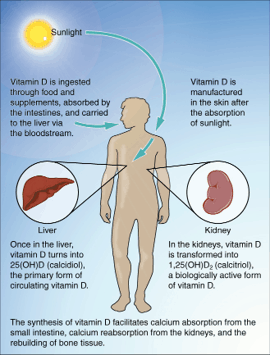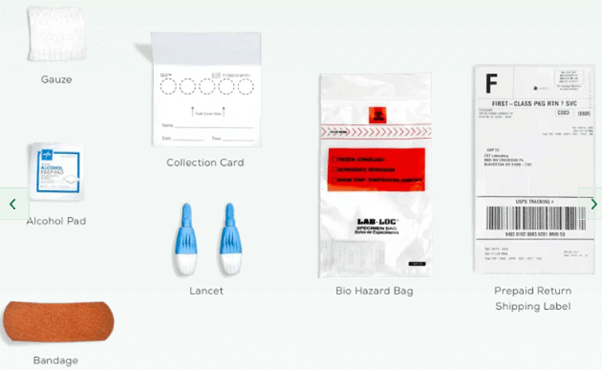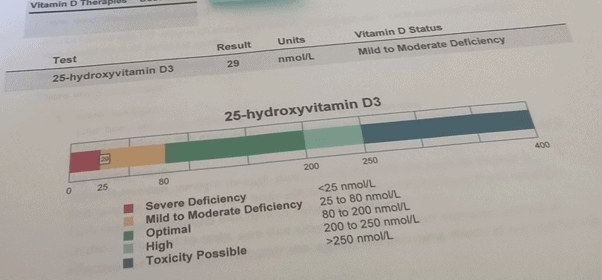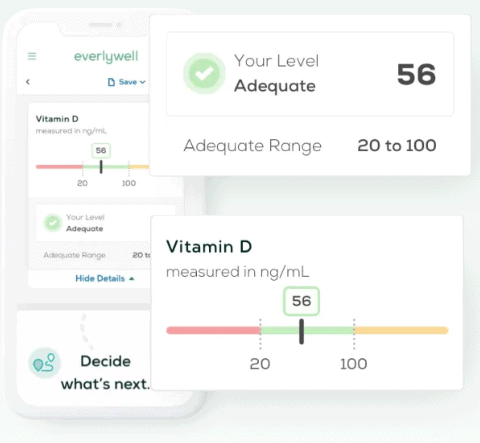Table of contents
5 Facts about a Vitamin D Home Test
- Purpose: A vitamin D home test helps determine if you have an adequate level of vitamin D to maintain bone and cellular health. The test measures two forms of Vitamin D in the blood: the 25-hydroxyvitamin D and 1,25-dihydroxy vitamin D, though the former is the more commonly measured marker.
- How it Works: The first step to getting a vitamin D home test is to order it online. An order should be delivered between 5 to 7 days with how-to-use instructions, test cards, and a return envelope. Follow the instructions to accurately perform the test and mail it to the lab. Results are expected between 5 to 24 days and are usually posted on a secure online portal.
- Cost: Vitamin D home test kits vary in price, usually ranging between $49–$79.
- Results: The test typically measures 25-hydroxyvitamin D and 1,25-dihydroxy vitamin D. A deficiency is identified if they fall below the recommended range. If there is a deficiency, the company may provide you with recommendations to help balance the deficiency. After following the tips, you will need to retake the test to track improvement.
- Recommended products: Nebula 30X Whole Genome Sequencing is a reliable DNA Test that decodes all of your genetic blueprints with high accuracy
What is a Vitamin D Home Test?
Vitamin D plays an essential role in immune function, bone health, and teeth. It is also vital in regulating blood levels of calcium, phosphorus, and sometimes magnesium. A vitamin D home test can help diagnose problems before they become serious.
Vitamin D is a fat soluble vitamin produced in the skin in response to sunlight. It is also found in some foods and commonly through supplements. A healthy supply of vitamin D is especially important for children because a deficiency could result in soft and malformed bones while children are still growing. The bone will also be unable to carry out self-repairs which could lead to rickets and osteomalacia.

Vitamin D is also a biomarker for conditions resulting from autoimmunity, inflammation, and cancer and it can be a precursor for conditions such as heart disease and type 2 diabetes. Because of this, checking your vitamin D levels are almost always measured as a part of home inflammation tests.
A vitamin D home health test can determine whether you have a sufficient vitamin D level in your blood or not through a simple DIY method.
When Should You Get Tested?
If you’ve been diagnosed with bone disease or show other signs of chronic inflammation, you may be at increased risk for vitamin D deficiency.
Risk factors for vitamin D deficiency include:
- Low sun exposure
- Age
- Being overweight or obese
- Not eating enough foods that contain vitamin D
- Impaired ability to absorb vitamin D in the digestive tract, including those who have had gastric bypass surgery and conditions such as Crohn’s disease
- Impaired ability of the body to convert vitamin D to a usable form in the body such as certain liver and kidney disorders.

Two main Vitamin D biomarkers are usually tested to determine deficiency:
25-hydroxy vitamin D (25-OH vitamin D)
Before the body can effectively use vitamin D, it has to go through several processes, with the first transformation occurring in the liver. At this stage, your body converts vitamin D to a chemical called 25-OH Vitamin D, and this is the major biomarker of most tests in determining whether there is a sufficient level of vitamin D in the body.
A healthy range is usually measured from 20 ng/ml to 100 ng/ml. A low 25-OHD can lead to osteoporosis which is bone weakness, and rickets which is bone malformation.
1,25-dihydroxy vitamin D
The 1,25 dihydroxy vitamin D is the biologically active form of vitamin D formed in the kidneys and is rarely tested to determine vitamin D deficiency. It may be checked when a patient is suffering from kidney disease or other abnormalities. Sometimes, it is also tested for when determining an abnormal rise in calcium.
How Much Does a Vitamin D Home Test Cost?
Before purchasing and ordering a vitamin D home test online, you should ensure that the company is a reputable one and has a track record of selling test kits that provide accurate results.
Here are some of the most reputable Test kit companies and their respective prices.
EverlyWell: EverlyWell is a proven giant in the area of home test kits, and the case is no different from the vitamin D test kit, which costs $49. For registered members, the cost is reduced to $24.99, which means that members get a discount of 49% from the standard price.
Grassrootshealth: Grassroot health sells its vitamin D home test kit at $79 for a one-time purchase. They also offer different subscription services at a discounted price:.
- Yearly subscription: $77/kit
- Six months: $75/kit
- Three months: $74/kit
Imaware: This is another reputable company to get a good vitamin D home test kit. The medical kit company sells its vitamin D test for $69.
GlucoRx: The GlucoRx test promises a quick 20 minutes result test for the price of $56.70
Getting Started with a Vitamin D Home Test
Vitamin D test kits test vitamin D concentrations in the blood to determine if there is a deficiency. Typically, vitamin D is a marker on its own or as a component of other tests such as inflammation.
Performing the test should only take a few minutes. Generally, each company test kits may come with a different package, but they almost all contain the same materials:
- A DIY instruction material
- An activation card
- One or more medical grade collection device card (commonly known as test cards)
- Envelope for returning both cards
- Lancets (finger pricking equipment)
- Wool
- Gauze pad
- Band aid
- Alcohol swab

The above materials are essentials in every Vitamin D test kit, so you would want to make sure they are all included. In most cases, you will need to register your Vitamin D home test kit with the company online to gain access to a unique personal code.
This code links your test with you and is the means of getting updates on whether your test cards have been received after performing the test and accessing your results when they are uploaded online.
Based on standard test requirements, it is recommended that you take the test at least 12 hours after your last meal. Most companies will advise you to start the 12-hour countdown right from when digestion processes begin to ensure nutrients and supplements will not alter the test result.
It is recommended that the test is performed in the morning just before you go about your daily activities or expose yourself to the morning sun, which is a significant catalyst of vitamin D surge and could alter the results. Also, bear in mind that the test, if taken in the morning, should have at least a range of 12 hours from the last meal of the previous day.
It is recommended to stop other medications and vitamin D supplements three days before the test. Never stop medication without the approval of your health care professional. For women, the test should be performed several days after the end of their menstrual cycle.
Several biomarkers are usually tested to determine Vitamin D deficiency, and the process is the same with most test kits.
Performing the EverlyWell Vitamin D Home Test
The EverlyWell Vitamin D home test kit measures your Vitamin D levels to determine if you are deficient by measuring the 25-hydroxyvitamin D biomarker and comparing it to healthy ranges. This is an example blood test that is similar to most other home tests on the market. The procedure of taking the test is as follows
- Wash and prep the right thumb
- Use the lancet to prick and apply pressure so the blood clots at the opening
- Place large blood spots on each card, making it a total of eight drops of blood
- Place the card on their package and mail it to the lab
Results are usually ready in 7–24 days and can be accessed online either through email or a secure online portal.
Vitamin D Home Test Results
The test result, as stated, will take at least seven days to arrive. The exact wait time will depend on the company you purchased the test kit from. The test result is pretty easy to read as only a single, or in rare cases, two biomarkers are measured.
The test is based on the biomarkers measured and compares the score arrived at to the healthy range. The most common biomarker measured is 25-hydroxyvitamin D. Suggested ranges include:
- Toxicity possible: > 250 nmol/L
- High levels: 200-250 nmol/L
- Optimal levels: 80-200 nmol/L
- Mild to moderate deficiency: 25-80 nmol/L
- Severe deficiency: <25 nmol/L

It’s important to remember that vitamin D results are subjective, especially when interpreting the sufficiency level of the 25-hydroxyvitamin D.
The interpretation of an optimal and sufficient vitamin D concentration has been controversial, with medical professionals not agreeing on a specific concentration level. Some experts consider a 25-hydroxyvitamin D level of 30 to 40 ng/ml as the standard reference range. If the level lies between 20 ng/ml to 30 ng/ml, it is rated as insufficient, and if below 20ng/ml is considered deficient.
Other experts consider a vitamin D status of 20 ng/ml as the starting line of an adequate level and generally use it as their basis for deficiency measurement.

The above result in the sample report from Everlywell above reads a patient’s vitamin D to be at 56 ng/mL, which is adequate or sufficient. Notice that the result is compared on a scale ranging from deficient (red), adequate (green), and over sufficient (yellow). An adequate result implies that the patient does not need drastic changes and is expected to have healthy bones and a strong immune system without chronic inflammation.
Other test kits typically have their range, but if you are considered short on Vitamin D concentrations, you will be provided with tips to help you get your level up. This may include recommendations for supplements or a change in diet.
It is also essential that you validate the test result for the first time using the kit by going to a medical doctor for review.
Even if your test shows a vitamin D deficiency, it does not necessarily point to an underlying condition. In fact, vitamin D deficiency is extremely common. In the United States alone, it was estimated that 42% of the population had a vitamin D deficiency in 2018.
Very low vitamin D levels may confirm a diagnosis if other symptoms of a known condition, such as chronic inflammation, are also present. For others, it may be a way to know if they should supplement their diet.
This is why many adults take vitamin D3 supplements to achieve their recommended 600 IU/day (800 IU/day for adults over 70).
You may also be interested in these other wellness tests you can take from home:
- Women’s health test (hormones, cholesterol, nutrients, and more)
- Men’s health test (hormones, proteins, cholesterol, and more)
- Heart health test (cholesterol and other lipids)
- Inflammation test (CRP, vitamin D, Procalcitonin, and more)
- Cholesterol test (total cholesterol, HDL, LDL, and triglycerides)
- Thyroid test (TSH, FT4, FT3, and TPO)
- Testosterone test (total, free, SHGB binding, albumin binding)
- Metabolism test (testosterone, TSH, cortisol, and progesterone)
- Food sensitivity test (immune response to up to 600 foods)
